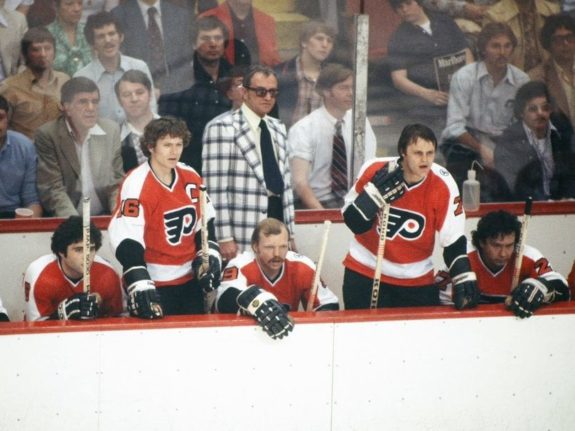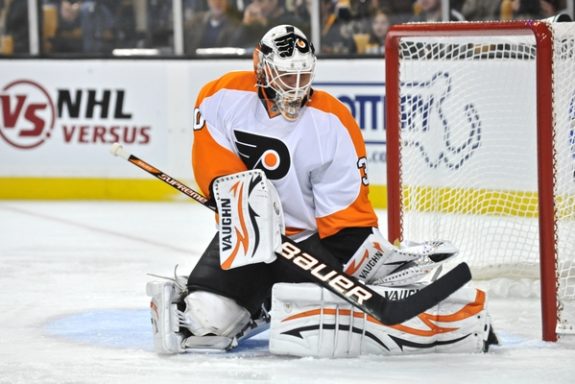The Philadelphia Flyers may not be a part of the Original Six teams that first took on professional hockey, but like many other teams in the league, they hold a rich history full of countless stories, legendary players, and hard-to-forget moments.
As the world moves into a new year, let’s not forget about the Flyers’ past with some facts that helped shape them into the organization it is today.
#4 The Flyers are Big Fans of the Canadian-Born Goaltenders
Since 1967 there have been 63 goaltenders who have worn the orange and black jerseys for the Flyers, 43 of them are Canadian. Of course, out of these 43 Canadians, two of the Flyers’ top goaltenders of all time are Canadian-born Bernie Parent and Ron Hextall.
Bernie Parent is a Montreal, Quebec native who was one of the most important goaltenders in the entire history of the Flyers as he helped lead them to two Stanley Cup championships in 1973-74 and again in 1974-75. He was also included in the NHL’s 100 Greatest Players in 1998. Parent, in his 10 years wearing orange and black, was easily one of the most influential Canadian-born netminders the Flyers had and was the first Flyer inducted into the Hockey Hall of Fame.
Related: Top 3 All-Time Flyers Goalies
Brandon, Manitoba native Ron Hextall was the first goalie to score a goal in the NHL. After his first year, Hextall put his name on the map with his ability to control the puck and his performance in the 1987 playoffs as a rookie. Hextall played 11 years in the league with Philly from 1986 to 1999, and his aggression and determination in front of the net would put him alongside Parent as one of the best Canadian-born goalies the Flyers have had.
#3 Longest Undefeated Streak
The 1979-80 Flyers may have been one of the most exciting teams during this specific season to watch. Nearing the end of the Broadstreet Bullies era, the team won 35 consecutive games (25 wins and 10 ties), making it the longest undefeated streak in NHL history.
Starting with a 4-3 win against the Toronto Maple Leafs on Oct. 14, 1979, and ending with a 7-1 loss against the Minnesota North Stars on Jan. 6, 1980, Bill Barber recalls the streak to Adam Kimelman saying, “there’s memories and moments, and that was a memory, not a moment. A great accomplishment by a great team.” Barber, now a Hockey Hall of Fame member, contributed 20 goals during the hot streak contributing to his 38 points.

Although the Flyers were deemed successful, they eventually lost in Game 6 of the Stanley Cup Final 6-5 in overtime after a goal by Bob Nystrom of the New York Islanders on May 24, 1980.
#2 Retired Jersey Numbers
The Flyers currently only sit with six jersey numbers retired as of 2023. One of the greatest goaltenders of all-time Parent’s No. 1 on Oct. 11, 1979, Mark Howe’s No. 2 on Mar. 5, 2012, Barry Ashbee’s No. 4 on Oct. 13, 1977, Barber’s No. 7 coincidentally on Oct. 7, 1990, Bobby Clarke’s No. 16 on Nov. 15, 1984, and most recently Eric Lindros‘ No. 88 on Jan. 18, 2018.
Related: Philadelphia Flyers History Trivia
Lindros, the last former player to have his number retired, was often described as: “a freight train on skates but also possessed the agility and skills to move quickly” by Doug Harrison of CBC Sports. Lindros, alongside the other legends to have their numbers hang in the rafters of Wells Fargo Center made a large imprint on the history of the team and created a lifetime of moments that Flyers fans will continue to tell stories about and remember to this day.
Although there may only be six players with their numbers off-limits, some may argue that there are some other honourable mentions that should have their jerseys join the rafters, such as Claude Giroux, Pelle Lindbergh, Hextall, and Brian Propp.
#1 Notable Nicknames
If you play hockey or are just a massive fan of the game, you’d know that nicknames are a huge part of a team’s relationship. They also make the game a tad more fun. Players all over the NHL also get nicknames according to their style of play or success within the league.
Of course, the most prominent nickname in Flyers history is the one given to the 1970s team, the “Broadstreet Bullies.” This team carried brutal enforcers and claimed to be the most fearsome team to play during their reign. This group led the Flyers to two Stanley Cups in 1973-74 and repeated that win in 1974-75.
“The Rat” was given to Ken Linseman, who played for the team from 1978-1982 (29 games in 1989-90). The name was given to him after he was known to be an irritable player against his opponents who delivered cheap shots nearly every time he stepped on the ice. Aside from being a world-class agitator, he was a successful goal scorer with the team and posted a total of 273 points in 269 games he played with the Flyers.

In 2012, the Flyers were set to play their rivals, the New York Rangers, in the NHL Winter Classic. HBO’s 24/7 was doing a segment following the teams and titled it Road to the Winter Classic. Ilya Bryzgalov was interviewed and began speaking on many different subjects. He told interviewers he was very into the universe, how it was created, and its problems. Not only did it steal the show, but it also earned the goaltender the nickname “Mr. Universe.”
“The Hammer” was the nickname given to Dave Schultz, one of the key enforcers in the Broadstreet Bullies era. Schultz played for the Flyers from 1972-1976 and was one person who was constantly dropping the mitts earning him his nickname. Schultz also managed 1,386 penalty minutes in his four years with the team.
Brian Ashbee was one of the first Flyers to have their jersey number hang in the rafters; he also had one of the most notable nicknames in Flyers history, “Ash Can.” Unlike the others, his nickname had nothing to do with his style of play; although he was tough on the ice, at the end of the day, it was just a play on words referring to his last name.
Plenty More History to Make
You could write a novel on all the exciting stories and moments the logo holds, and as the Flyers continue to play on, the history will continue to be written, making for many more fun Flyers facts to come.
